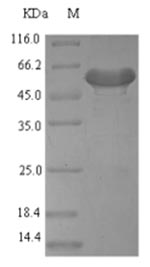The recombinant mouse Pdgfd protein is co-expressed with an N-terminal 6xHis-SUMO tag in E. coli. The Pdgfd gene fragment (24-370aa) with the N-terminal 6xHis-SUMO tag gene is cloned into a suitable vector, which is transfected into E.coli cells. E.coli cells are induced to express the Pdgfd protein following the addition of IPTG. The Pdgfd protein is purified using Ni-NTA affinity chromatography. After elution, the purified recombinant Pdgfd protein is analyzed using SDS-PAGE to obtain a purity greater than 90%.
Mouse Pdgfd is secreted as a disulfide-bonded dimer and primarily signals through the PDGFR-β [1][2]. It has been implicated in several physiological and pathological conditions, including vascular remodeling, fibrosis, and tumor progression.
In the context of vascular biology, Pdgfd has been shown to induce significant changes in vascular smooth muscle cells (vSMCs), leading to conditions such as cardiac fibrosis and atherosclerosis [3][4]. Specifically, studies have demonstrated that overexpression of Pdgfd in transgenic mouse models results in enhanced proliferation of vSMCs, which contributes to the thickening of the vessel wall and subsequent cardiovascular complications [3][5]. Furthermore, Pdgfd has been associated with mesangial cell proliferation in renal glomerulopathy, indicating its role in kidney disease [6][7].
Pdgfd has been recognized for its involvement in tumor biology. It has been shown to promote tumor growth and invasion in various cancer models, including prostate and endometrial cancers [8][9]. In prostate cancer, Pdgfd not only enhances tumor cell proliferation but also facilitates interactions with the surrounding stroma, which is critical for tumor progression [10]. Additionally, Pdgfd has been linked to glioma pathogenesis, where it contributes to tumor growth and angiogenesis [11][12]. The signaling pathways activated by Pdgfd are complex and involve various downstream effects, including the activation of matrix metalloproteinases, which are crucial for extracellular matrix remodeling and tumor metastasis [9][13].
References:
[1] H. Gladh, E. Folestad, L. Muhl, M. Ehnman, P. Tannenberg, A. Lawrence, et al. Mice lacking platelet-derived growth factor d display a mild vascular phenotype, Plos One, vol. 11, no. 3, p. e0152276, 2016. https://doi.org/10.1371/journal.pone.0152276
[2] W. Huang and H. Kim, Dynamic regulation of platelet-derived growth factor d (pdgf-d) activity and extracellular spatial distribution by matriptase-mediated proteolysis, Journal of Biological Chemistry, vol. 290, no. 14, p. 9162-9170, 2015. https://doi.org/10.1074/jbc.m114.610865
[3] A. Pontén, E. Folestad, K. Pietras, & U. Eriksson, Platelet-derived growth factor d induces cardiac fibrosis and proliferation of vascular smooth muscle cells in heart-specific transgenic mice, Circulation Research, vol. 97, no. 10, p. 1036-1045, 2005. https://doi.org/10.1161/01.res.0000190590.31545.d4
[4] Z. Zhang, C. Ruan, J. Lin, L. Xu, X. Chen, Y. Du, et al. Perivascular adipose tissue–derived pdgf-d contributes to aortic aneurysm formation during obesity, Diabetes, vol. 67, no. 8, p. 1549-1560, 2018. https://doi.org/10.2337/db18-0098
[5] Y. Cheng, Z. Zhang, B. Lan, J. Lin, X. Chen, L. Kong, et al. Pdgf-d activation by macrophage-derived upa promotes angii-induced cardiac remodeling in obese mice, The Journal of Experimental Medicine, vol. 218, no. 9, 2021. https://doi.org/10.1084/jem.20210252
[6] K. Hudkins, D. Gilbertson, M. Carling, S. Taneda, S. Hughes, M. Holdren, et al. Exogenous pdgf-d is a potent mesangial cell mitogen and causes a severe mesangial proliferative glomerulopathy, Journal of the American Society of Nephrology, vol. 15, no. 2, p. 286-298, 2004. https://doi.org/10.1097/01.asn.0000108522.79652.63
[7] C. Roeyen, F. Eitner, P. Boor, M. Moeller, U. Raffetseder, L. Hanssen, et al. Induction of progressive glomerulonephritis by podocyte-specific overexpression of platelet-derived growth factor-d, Kidney International, vol. 80, no. 12, p. 1292-1305, 2011. https://doi.org/10.1038/ki.2011.278
[8] C. Ustach, M. Taube, N. Hurst, S. Bhagat, R. Bonfil, M. Cher, et al. A potential oncogenic activity of platelet-derived growth factor d in prostate cancer progression, Cancer Research, vol. 64, no. 5, p. 1722-1729, 2004. https://doi.org/10.1158/0008-5472.can-03-3047
[9] Y. Wang, H. Qiu, H. Weixu, S. Li, & J. Yu, Over-expression of platelet-derived growth factor-d promotes tumor growth and invasion in endometrial cancer, International Journal of Molecular Sciences, vol. 15, no. 3, p. 4780-4794, 2014. https://doi.org/10.3390/ijms15034780
[10] A. Najy, Y. Jung, J. Won, M. Conley-LaComb, A. Saliganan, C. Kim, et al. Cediranib inhibits both the intraosseous growth of pdgf d‐positive prostate cancer cells and the associated bone reaction, The Prostate, vol. 72, no. 12, p. 1328-1338, 2011. https://doi.org/10.1002/pros.22481
[11] A. Arias, M. Lamé, L. Santarelli, H. R, L. Greene, & J. Angelastro, Regulated atf5 loss-of-function in adult mice blocks formation and causes regression/eradication of gliomas, Oncogene, vol. 31, no. 6, p. 739-751, 2011. https://doi.org/10.1038/onc.2011.276
[12] P. Gong, Y. Wang, P. Ge, C. Bailey, P. Zhang, D. Zhang, et al. The hif1α-pdgfd-pdgfrα axis controls glioblastoma growth at normoxia/mild-hypoxia and confers sensitivity to targeted therapy by echinomycin, Journal of Experimental & Clinical Cancer Research, vol. 40, no. 1, 2021. https://doi.org/10.1186/s13046-021-02082-7
[13] L. Xu, R. Tong, D. Cochran, & R. Jain, Blocking platelet-derived growth factor-d/platelet-derived growth factor receptor β signaling inhibits human renal cell carcinoma progression in an orthotopic mouse model, Cancer Research, vol. 65, no. 13, p. 5711-5719, 2005. https://doi.org/10.1158/0008-5472.can-04-4313






